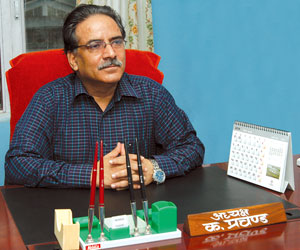 MIN RATNA BAJRACHARYA |
I can't give you 100 per cent guarantee, but our party firmly believes the constitution will be written by the deadline. We may have to make certain amendments, but the parties already have an understanding and have successfully forged an agreement. If we fail this time, we won't be able to face the public, so there is no way out.
Certain groups are demanding ethnicity based federal units. What are your thoughts?
I don't see it only as ethnicity based federalism. This is about identity, not ethnicity. For example the calls for Karnali and Seti-Mahakali provinces are not based on ethnicity, but on identity. People from these regions have been marginalised and lived under a central government for too long .They now want equal rights and recognition. If we do not address their demands, we will be ignoring the people's problems.
You said there is close agreement on a mixed system of governance with a directly-elected president.
Yes, after long discussions among the parties in the Dispute Resolution Sub-Committee, we came to the conclusion that a mixed system of governance is the way to go. We have set up a team which will analyse the experiences of other countries and offer recommendations. This agreement still stands true. We are now trying to figure out how to manage the distribution of power. A weak president is against the ideals of democracy. A directly-elected president is entitled to key powers and will not be just ceremonial. However, we have seen forces that want to limit the power of the president.
The intra-party rift has turned very public in recent times. Why have issues not been resolved yet?
It may look like that from the outside, but we have the situation under control. We have been friends for over 30 years, but recently competition within the party has increased and this is not favourable. We have decided that our Baidya faction friends should be allowed to voice their opinions in public, and protest. We will also express our opinions, but the party will not break. Expressing one's belief while keeping the party united is very important, that is our strategy for now. Let's see where it leads us.
Would you say that geo-political factors are influencing the constitution writing and peace process?
Of course. To begin with, the 12-point deal was forged in Delhi. Present political processes clearly show geo-political influence. If we talk about the constitution, we have been deliberating on the political systems of China and India and interacting with their leaders. There is direct as well as indirect effect. But it is not just China and India, even South Africa, Europe and the US are interested in Nepal's constitution. While some influences are positive, others are negative. Nepalis, intellectuals and leaders now need to reject unnecessary meddling and work for the country's best interests.


